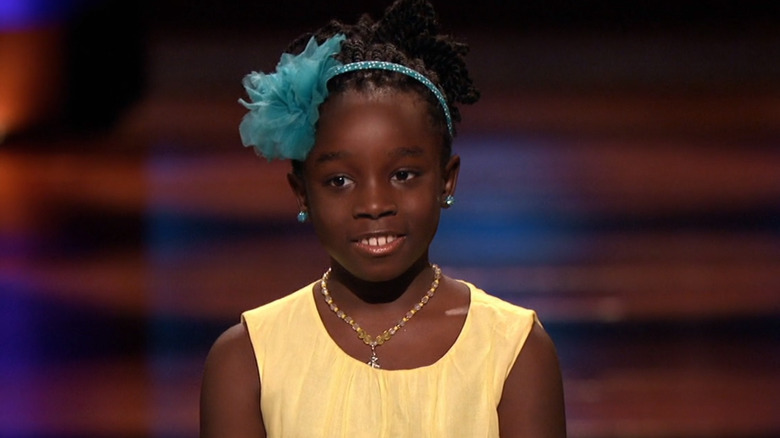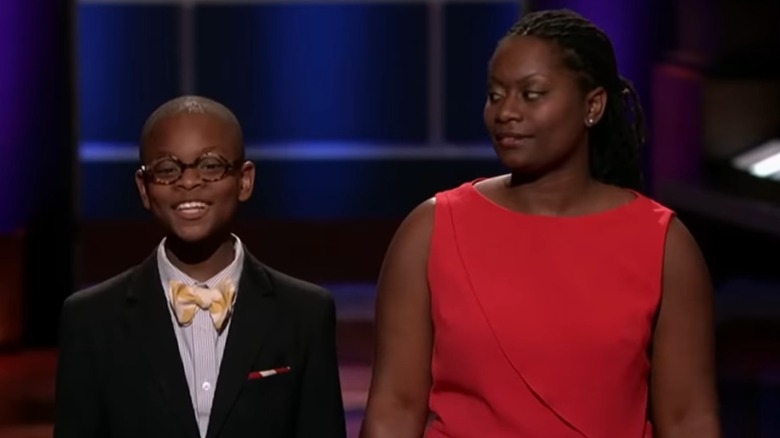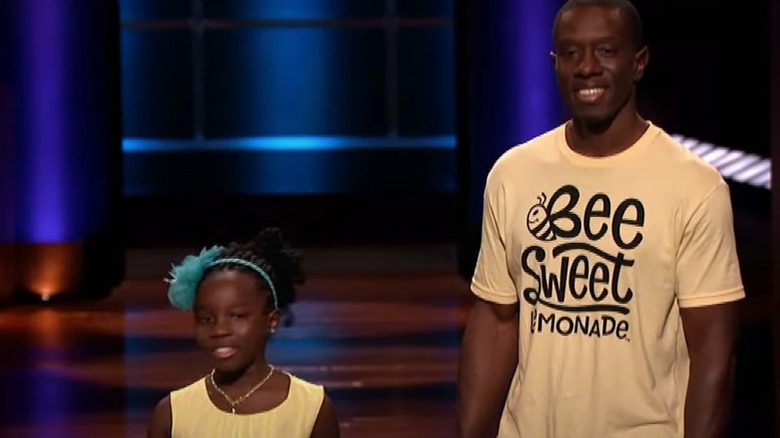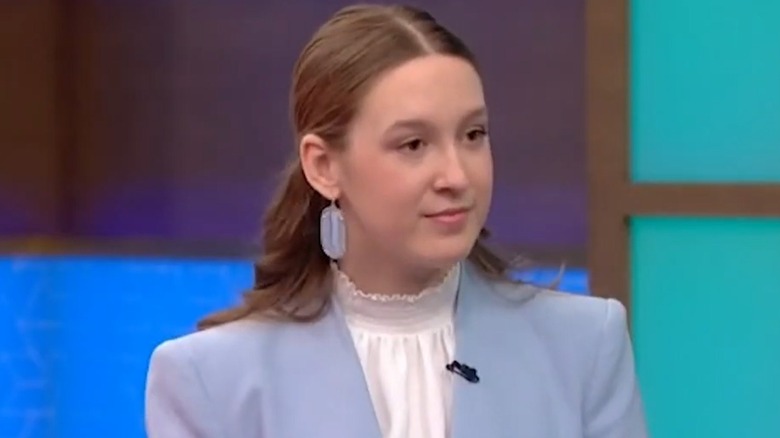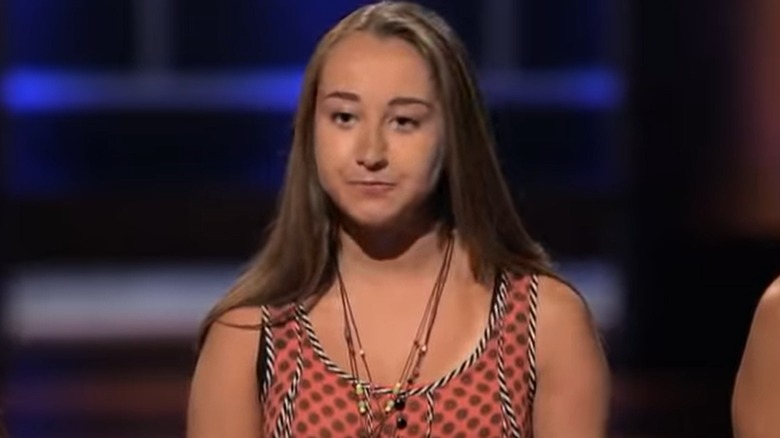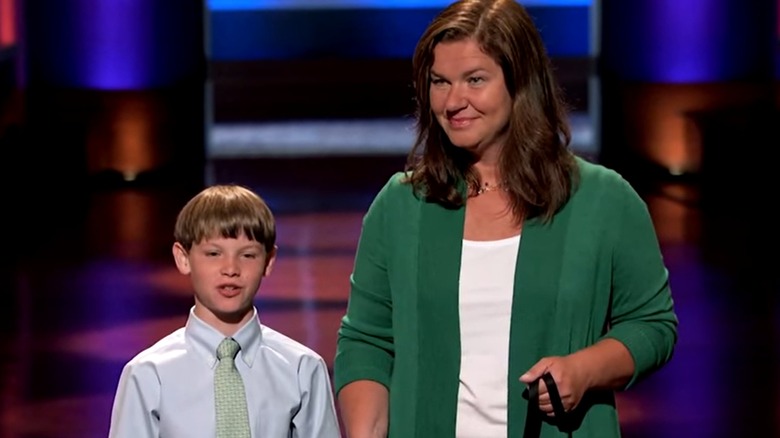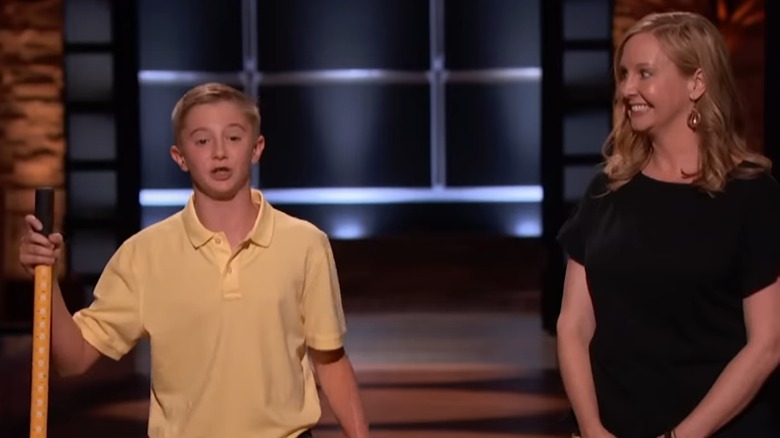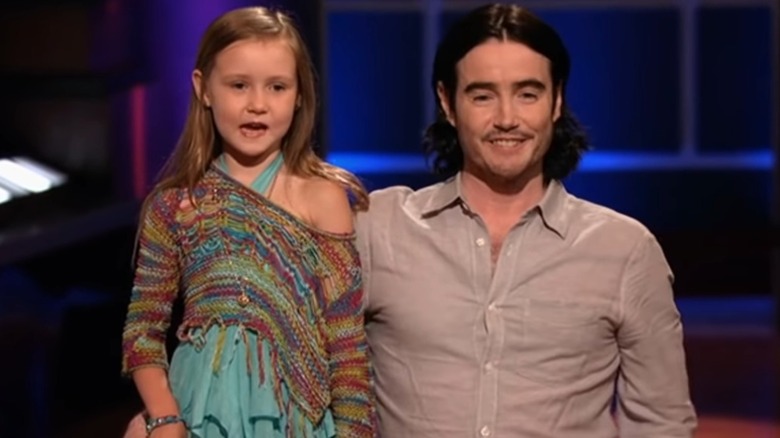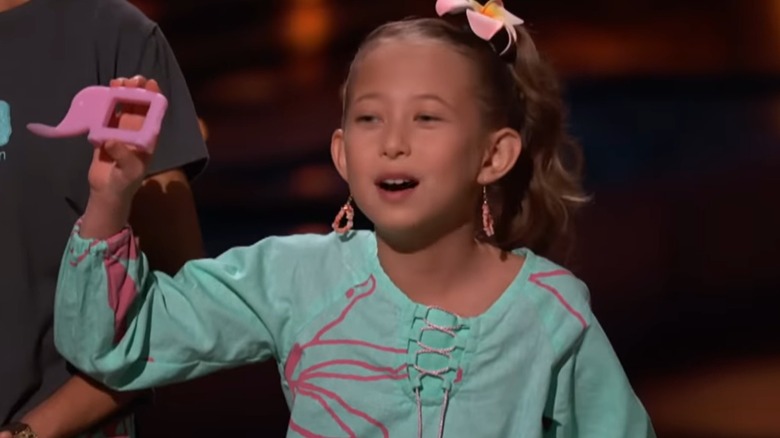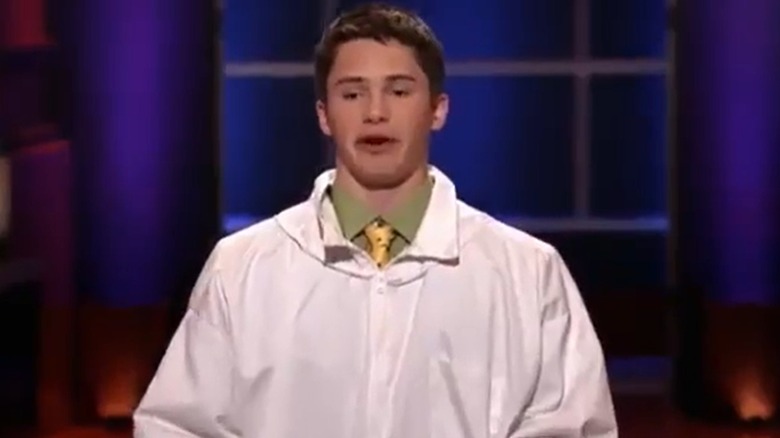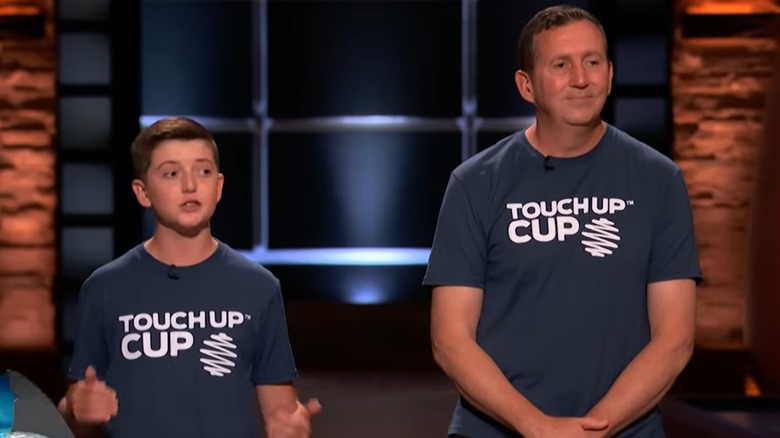Whatever Happened To Shark Tank's Most Famous Child Entrepreneurs?
"Shark Tank" is one of those shows best enjoyed while flicking through channels, when you stumble upon ABC randomly airing an omnibus of episodes. It takes surprisingly little time for fans to get thoroughly hooked, laughing with — and sometimes loathing — at least one of the judges.
The format of "Shark Tank" has been tried and tested worldwide, originally starting as Sony Pictures Television's "The Tigers of Money" in Japan. It later spread across the globe with various names, each cleverly playing on a particular country's scariest animal. You've got the UK with "Dragon's Den" and Germany with "The Lions' Den." (But leave it to the French to do things differently: They went with "Qui veut être mon associé?" which translates to "Who wants to be my business partner?")
The show revolves around contestants convincingly presenting their business ideas as viable to the judges, or "sharks." It's a refreshing change from other reality TV where judges hog the spotlight, and we never hear from the contestants again. "Shark Tank" shines the spotlight on those brave souls, young and old, who dare to dream big. Notably, the show's focus on a start-up company makes it easy to support and follow the latest and greatest contestants, allowing viewers to stay updated on their progress. While most of their contestants have been adults, there have been more than a few kids turning up on the show with their latest money-making scheme.
The episodes featuring young entrepreneurs add an extra layer of charm to the show. They highlight the unwavering devotion of parents, the surprisingly kind reactions of the sharks, and how much these young entrepreneurs genuinely care about their ventures. Let's take a look at how a few of the show's youngest contestants are doing today.
Moziah Bridges
One of the standout features of "Shark Tank" is the uniquely antagonistic dynamic among the sharks. When a contestant enters their "tank" with a brilliant idea, the sharks don't hold back: They fight for the best deals and aren't afraid to tease each other. This was evident when 11-year-old Moziah Bridges, the CEO of Mo's Bows, walked hand-in-hand with his mother, Tramica Morris, who playfully referred to herself as "the CEO of Mo."
From the moment Moziah and Tramica stepped in, it was clear that Moziah's charisma would leave the judges impressed. They acknowledged that Mo's Bows was a well-run ship, with three employees and an overflow of orders. However, most of the sharks were unfamiliar with the fashion industry. Kevin O'Leary pitched an offer, wanting a $3 cut from every sale for a $50,000 investment. On the other hand, Daymond John offered a more sensible mentorship deal, and wisely, Tramica Morris chose the latter.
Since then, Daymond John has introduced Moziah Bridges to an accomplished manufacturer, Robert Steward, who helped enhance production. As a result, the company now sells regular ties and has a product line available in multiple stores. Mo has had the incredible opportunity to meet prominent figures like President Obama and Steve Harvey. Moreover, he has made partnerships with the NBA and has even been featured in prestigious magazines like Fortune. With sales reaching upwards of $700,000, Mo's Bows has undeniably come a long way since its "Shark Tank" appearance.
Mikaila Ulmer
Some episodes of "Shark Tank" truly showcase the art of the perfect pitch. Even the most casual fans find themselves critiquing a business from its substance to its viability, and, most importantly for this situation, the perfect pitch. The moment Mikaila Ulmer stepped onto the set, it was evident that she could sell just about anything to the sharks.
However, Mikaila's success wasn't solely reliant on charm; she had been honing her entrepreneurial skills since the tender age of four. Her parents offered her financial lessons, presenting two options for how she could spend her free time: Do more chores and earn an extra allowance, or save her money and invest in a business. Mikaila chose the latter path and started a lemonade company that infused honey into their ingredients, giving birth to "Me and The Bees Lemonade." The ultimate hook for the sharks was that a portion of her company's revenue went to organizations dedicated to protecting bees.
Since her "Shark Tank" appearance, the scale of Mikaila Ulmer's company has soared. It can now be found in over 1500 stores, with an impressive 2 million bottles sold. Her team has grown considerably, including marketers, accountants, and more. "Me and The Bees" has expanded its reach to all 50 states.
As for Mikaila Ulmer herself, she's accomplished remarkable feats. She has given talks at Google, taught South African girls about business, and even had the honor of introducing President Obama at an event, among numerous other personal achievements.
Alina Morse
By the time Alina Morse graced the set of "Shark Tank," her company was already riding the wave of success, earning features in prestigious publications like Inc Magazine as one of America's fastest-growing companies. The idea for Morse's company, Zolla Candy, was sparked when her parents refused to let her have candy from the bank, citing its harmful effects on teeth. Determined to make a difference, Morse vowed to create tooth-friendly candy.
Zolla Candy not only keeps your dentist happy but also satisfies your sweet tooth. When Morse appeared on "Shark Tank," it felt more like a victory lap than a quest for a major investment. She had already made the cover of Entrepreneur magazine. Barbara Corcoran accurately assessed Morse's prowess, declaring, "This lady does not need advice."
Since then, Zolla Candy has skyrocketed, securing spots in over 20,000 stores and becoming one of the best-selling sugar-free candies on Amazon. Alina Morse continues to shine in the limelight, making appearances on various TV show segments and gracing covers of publications like American Essence Magazine.
Zolla Candy has achieved sales of over $10 million to date, thanks to its diversified product line. Alina Morse, the company's leader, attributes her success to her exceptional delegation skills.
Maddie Bradshaw
The creative and resourceful nature of children often leads them to try making their jewelry at some point, emulating the adults surrounding them. However, not many can transform this into a thriving business. Maddie Bradshaw achieved just that when she teamed up with her mom and younger sister Margot to create a successful company called M3 Girl Designs, where they turned bottle tops into trendy jewelry.
When the team appeared on "Shark Tank," they had already achieved sales in the millions, making it an enticing opportunity for the sharks. In an uncommon move, three sharks eagerly invested $300,000 for a 15% stake in their business. Over the following decade, M3 Girl Designs experienced both triumphs and setbacks.
They successfully expanded their product lines to include journals, hair bows, and bracelets. Maddie Bradshaw, a young entrepreneur, even authored a book titled "You Can Start a Business, Too!" that provides business advice tailored to younger readers. Unfortunately, the company faced challenges as well. They became entangled in three copyright infringement lawsuits, which they ultimately lost. These legal battles, along with Maddie Bradshaw's enrollment at Stanford University in 2015, contributed to the eventual shutdown of M3 Girl Designs.
After the journey with M3 Girl Designs, Maddie Bradshaw earned a Master of Education from Harvard in 2019. She took a different path and embraced her passion for teaching, becoming an educator herself.
Ryan Kelly
Ryan Kelly's pitch to the sharks stood out because, in contrast to many successful entrepreneurs on the show, he had only made $800 in sales. Despite the low sales figure, what intrigued the sharks was the impressive profit margin of his dog treats. Kelly managed to produce the treats for just 40 cents each and sold them for $4, making his business model attractive.
Ryan and his mom Daniela were seeking $25,000 for a 25% stake in their business, and after some tough negotiations, Barbara Corcoran offered them the deal they were seeking. In the following season, they returned to the show with exciting updates. Their business had grown significantly, now generating six-figure sales and being available in over 30 stores. To enhance their brand, they also changed the name from Ryan's Barkery to Ryan's Ruffery. The business continued to flourish, making over $10,000 in sales per month and even securing a spot in the retail giant Target.
However, challenges arose when Daniela's health began to deteriorate. Despite her medical condition, she continued to work tirelessly for the company, and their efforts paid off when Petsmart placed an order for 400 stores. At a certain point, Barbara was worried about how hard Daniela was working and suggested she get help. Sadly, Daniela passed away in October 2018, and this devastating event took a toll on the business, ultimately leading to its decline and eventual fizzling out.
Maddox Prichard
Maddox Prichard presented a clever and innovative idea to the sharks — a shovel with a built-in measuring scale, perfect for precise planting. With help from his family and a pro bono lawyer, he successfully patented the concept.
During his pitch, Maddox sought $40,000 for a 15% stake in his business. The sharks were impressed by the idea's potential, but since the business was still in its early stages, they counter-offered $40,000 for a larger 30% stake, which he accepted. However, despite the agreement on the show, the deal eventually fell through, and the sharks withdrew their investment from the company.
At present, the company's website indicates that the measuring shovel is not available for sale. This is likely due to the fact that, during the pitch, Maddox mentioned the need for the sharks' investment to create the mold for manufacturing the actual measuring shovels since what he presented on the show was just a prototype.
Despite the initial setback, Maddox Prichard has remained active with his invention, engaging as a keynote speaker at invention conventions nationwide. The company's Facebook page also reveals its determination to persevere — perhaps better days lie ahead for Maddox's innovative measuring shovel. His journey is particularly of note because when the episode aired, Maddox's company gained significant interest from the public. Regardless of how this company's future will turn out, Maddox Prichard seems likely to land on his feet.
Kiowa Kavovit
Kiowa Kavovit got an injury and needed a band-aid. Like most 6-year-old girls, she didn't like how the band-aid looked. So she asked her father Andrew if she could get a different type of band-aid where she could simply paint over her injury. Andrew then took it upon himself to find a wound care chemist who could help him create a paint-on band-aid, and they were successful.
The company name they ended up choosing was BooBoo Goo, stored in a typical nail polish container and offering all the colors of the rainbow (or just a user's skin tone, if they prefer a natural look). The idea was so great that Kiowa was able to secure a $100,000 investment from Kevin O'Leary, despite not having secured a patent yet.
In the immediate aftermath of the show, the company managed to finalize its deal with Kevin O'Leary. They even expanded their product line. However, the company never quite managed to get its products on the market, and it still remains to be seen what Kevin O'Leary plans on doing with his licensing deal in the future. Kiowa took the failure in stride, and since then, she and her father have pivoted their idea to a new rebranded name: Eco Bandage, which highlights how good the idea is for the environment. Apparently, one Eco Bandage can replace the space 100 would take when eventually disposed of in a landfill.
Cassidy Crowdey
Cassidy Crowdey remains one of the most charismatic presenters on "Shark Tank," defying age expectations with her impressive confidence. At just 10 years old, she astounded everyone by explaining how she came up with the brilliant idea of a silicone spoon for infants, ensuring they can eat safely without any harm.
The inspiration behind the spoon was her younger sister, whose eating habits worried their mother. Cassidy's innovative silicone spoon was designed to prevent choking hazards and discomfort for little ones. When she and her mother pitched the idea to the "Shark Tank" investors, they struck a deal with Lori Greiner, who invested $50,000 for a 50% stake in their company.
Since 2018, the company has been thriving, making sales and touching hearts with its charitable efforts. They generously donated to Kapiolani Medical Center for Women & Children and Goal Money. Their success caught the attention of the baby company Munchkin, leading to a partnership. Today, you can find their spoons on Amazon and the Munchkin website, as well as in major retailers like Walmart and Target.
The company's hard work and Cassidy's remarkable talents have paid off, as their net worth has soared to around $1 million, with even more potential for growth in the future. When Cassidy isn't busy being the CEO of her company, she enjoys pursuing her hobbies, such as playing the violin and hula dancing.
Henry Miller
They say "Dress for the job you want," and Henry Miller took this advice to heart. When he entered the pitching room on "Shark Tank," he donned a bee suit to grab the sharks' attention for his company which sells spicy honey. His unique pitch started with a tale of receiving a beehive as a gift when he was younger, which led him to sell honey. But he knew he had to stand out, so he unveiled a business suit under the bee suit, symbolizing his idea of adding spice to the honey, creating a unique and versatile flavor that complements various foods and drinks.
In the "Shark Tank" pitch, Henry offered 25% of his company for $150,000. Despite already achieving $50,000 in sales, the sharks were hesitant, fearing that his idea could be easily copied. Robert Herjavec made a bold offer of $300,000 for 75% of the company, and Henry accepted.
After the show, Henry's company experienced significant growth, expanding by 300%. However, personal challenges within his family forced him to make a difficult decision, and he had to close the company. Currently, Henry is focusing on his college education, with Mark Cuban coincidentally serving as one of his references in his applications. Henry's journey has certainly encountered valleys, but what's important is just how well he's responded. It won't be soon before he fully bounces back up.
Carson Grill
Carson Grill and his father faced a challenge with their used paint always rusting when it was stored after opening. To solve this problem, Carson came up with an airtight plastic container with a stainless steel bearing inside to act as a mixer, ensuring the paint remains reusable and rust-free.
When they pitched to the "Shark Tank" investors, they already had their product in 4,000 stores statewide and sought $150,000 for a 10% stake. The sharks were impressed, especially when they learned about the company's expanding product line. This led to a bidding war, and Carson ultimately accepted Blake's offer of $200,000 for a 25% stake.
In the update segment, viewers saw Carson and his business thriving. They closed a 3000-store-deal with Walmart and a 1700-store-deal with Lowes. His company became a million-dollar venture, with sales exceeding $3 million in 2022. Carson celebrated his success by buying a car, and now his goal is to reach $5 million in sales before starting college. They've also expanded their product line to brushes, rollers, and other painting products.
